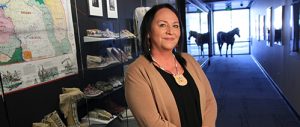22 Mar Minot State’s Mennem uses family history for Native American diversity, cultural training
 For Annette (Grant) Mennem ‘00/’07, Minot State University Native American Center director and Diversity Council co-chairperson, family stories and culture aren’t just a part of history; they are fluid and play a part in everyday life.
For Annette (Grant) Mennem ‘00/’07, Minot State University Native American Center director and Diversity Council co-chairperson, family stories and culture aren’t just a part of history; they are fluid and play a part in everyday life.
“My grandparents, my great-grandparents, my parents, they all went to a boarding school,” said Mennem. “And part of what I want to teach is that what happens from that boarding school, it’s a historical trauma. It moves forward, it’s a generational trauma.”
Beginning in the late 19th century, the U.S. government began forcing Native American children to attend boarding schools in the name of assimilation. The schools forbade children from using their own languages and names, as well as from practicing their religion and culture.
“In my family and in most families that I know from living and growing and working on reservations is that most families deal with what I deal with: when you have parents and grandparents and great-great-grandparents that went to boarding school, they don’t know what it is to be in a family, so they don’t know how to parent,” Mennem said.
This piece of history and its present day ramifications are just part of what she touches on during diversity and cultural training.
Mennem is often approached to present for different groups — from the North Dakota Conference of Social Workers to PATH North Dakota to the Minot Job Corps — and she usually begins by talking about stereotypes before moving into the need for self-sovereignty and the importance of recognizing differences.
“I try to impress into them that the whole philosophy of ‘I treat everyone the same,’ isn’t correct. I used to think that way, too, because I thought that was the right way. Or they’ll say, ‘I don’t see color,’ and I used to think that was cool, too. But, in reality, that’s not right because if you don’t see my color, you don’t see me,” she said.
The importance of recognizing differences will be a main topic of conversation at Trinity Health on March 18. Mennem will be educating staff on Native American ceremonial protocols.
“They want to make sure that they’re doing things correctly so that when they have families here, they understand why there’s feathers and why there’s certain blankets and why there’s sage and what they can do with it,” she explained.
Trinity Health’s chaplain first contacted Mennem a year and a half ago in regards to a non-denominational worship area that will be built in their new facility, wanting to make sure Native American beliefs are included during the planning process.
That consideration is part of a positive cultural shift she’s witnessed over the past few decades, both in the city and on the Minot State campus.
“I think that change is happening, not just because the city is growing, but because of the generation. The dynamic is changing. It feels better, even when visiting with new students. They feel that, they see the diversity, they feel the diversity. The Native American Center is being used more and more by all students,” Mennem said. “They feel that home away from home.”


